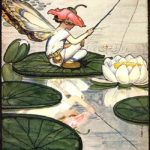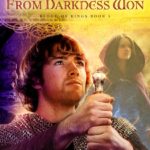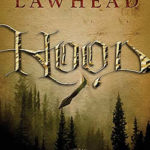Fantasy: Where To Go Next?
You want to introduce a friend of yours to fantasy. Where do you start? That seems like a no-brainer. Start with the best — Lewis and Tolkien. But then what? What if this particular friend of yours says, I love this fantasy stuff you’ve given me — The Chronicles of Narnia and The Lord of the Ring. Love, love, love them. What should I read next? What do you say?
One suggestion I’d make is Lloyd Alexander’s The Chronicles of Prydain. That children’s series consists of five books: The Book of Three, The Black Cauldron, The Castle of Llyr, Taran Wanderer, and The High King.

First, the books are well written. As testimony to that fact, the second in the series received the Newbery Honor, and the final book earned the Newbery Medal, the highest award given to children’s fiction.
Second, Alexander created a familiar story — good versus evil — without making it a Tolkien or Lewis knock-off. Welsh mythology influenced him, and yet he was not simply re-writing those tales. In other words, The Chronicles of Prydain expand the genre while still being part of it.
In that regard, the books are reflective of fantasy. They involve classic elements — swords and knights and quests and evil creatures to defeat. There is magic, too, both good and evil. Mostly, though, the stories are about true heroism and real royalty.
Which brings up the third reason these books are good ones to read as a gateway into further fantasy. They do what good fantasy always does — ennobles the reader. Because the central character, Taran, the Assistant Pig Keeper, learns and grows in believable ways, the reader gets a clear picture of what is best and highest, what is good and noble.
Taran is also a character readers can identify with. He wants action. He wants to accomplish great things. He doesn’t want to pay attention to lowly jobs or the simple assignments that are actually his. The combination makes him someone readers can admire but also someone to worry about because he’s prone to run ahead of where he should be.
The Chronicles of Prydain are also good books for someone relatively new to fantasy because they are fast reads. The pace is crisp, the length of each story is moderate. No one will feel bogged down in the details in Alexander’s story world.
The books also are laced with humor — especially appealing to a younger audience, but something any reader can appreciate. In that regard, some of Andrew Peterson’s work, particularly On the Dark Sea of Darkness and North! Or Be Eaten remind me of Alexander’s incorporation of humor with danger.
Here’s a short excerpt from The Book of Three. A company of friends is forming and they are getting to know each other.
Taran had been in a dungeon. A servant of the proprietor, Eilonwy, helped him to escape and also to free the other prisoner who Taran believed was the prince he’d been traveling with. Instead the man he freed turned out to be the bard Fflewddur Flam, carrying a special harp. He had just finished tying one of the harp strings that broke while he was in the midst of giving a false interpretation of an inscription on Eilonwy’s sword.
Eilonwy turned her irritation on Fflewddur. “That inscription was a very important one. It didn’t say anything about bewaring anyone’s wrath. You didn’t read it right at all. You’re a fine bard if you can’t make out the writing on an enchanted sword.”
“Well, you see, the truth of the matter,” said Fflewddur, clearing his throat and speaking with much hesitation, “is this way. I’m not officially a bard.”
“I didn’t know there were unofficial bards,” Eilonwy remarked.
“O, yes indeed,” said Fflewddur. “At least in my case. I’m also a king.”
“A king?” Taran said. “Sire . . .” He dropped to one knee.
“None of that, none of that,” said Fflewddur. “I don’t bother with it any more.”
“Where is your kingdom?” Eilonwy asked.
“Several days journey east of Caer Dathyl,” said Fflewddur. “It is a vast realm . . .”
At this, Taran heard another jangling.
“Drat the thing,” said the bard. “There go two more strings. As I was saying. Yes, well, it is actually a rather small kingdom in the north, very dull and dreary. So I gave it up. I’d always loved barding and wandering — and that’s what I decided to do.”
“I thought bards had to study a great deal,” Eilonwy said. “A person can’t just go and decide . . .”
“Yes, that was one of the problems,” said the former king. “I studied; I did quite well in the examinations . . .” A small string at the upper end of the harp broke with a high-pitched tinkle and curled up like an ivy tendril. “I did quite poorly: he went on, “and the Council of Bards wouldn’t admit me. Really, they want you to know so much these days. Volumes and volumes of poetry, and chants and music and calculating the seasons, and history; and all kinds of alphabets you spell out on your fingers, and secret signs — a man couldn’t hope to cram it all into his skull.
“The Council were very nice to me,” continued Fflewddur. “Taliesin, the Chief Bard himself, presented me this harp. He said it was exactly what I needed. I sometimes wonder if he was really doing me a favor. It’s a very nice harp, but I have such trouble with the strings. I’d throw it away and get another, but it has a beautiful tone; I should never find one as good. If only the beastly strings . . .”
“They do seem to break frequently,” Eilonwy began.
“Yes that’s so,” Fflewddur admitted, a little sheepishly. “I’ve noticed it usually happens when — well, I’m an emotional sort of fellow, and I do get carried away. I might, ah, readjust the facts slightly; purely for dramatic effect, you understand.”
Fflewddur’s frequently breaking harp strings, then, become a running joke throughout the series.
Humor, a quick pace, good writing, fresh elements within the fantasy tradition — these factors and more make me think The Chronicles of Prydain is an excellent gateway series to give someone fairly new to the genre. Of course, it isn’t the only one. What books or series would you recommend?











































I just ordered the first book in the series from paperbackswap.com for my fantasy loving son. I hope it grabs him the way it has grabbed you!
Oh, yes. Taran is a lovely little pig keeper.
I would point people to Megan Whalen Turner’s Attolia books.
These are adult books, but teens would like them, I’m sure. There’s wonderful world building and characterization in these, I think.
Another book to consider is Lloyd Alexander’s The Golden Dream of Carlo Chuchio. This one has an Arabian Nights feel to it and follows an odd cast of characters on a road trip through a desert and demonstrates that fantasy doesn’t have to be medieval. If you are familiar with Alexander’s Chronicles of Prydain, it is tempting to see parallels between the characters, such as Carlo to Taran, Shira to Eilonwy, Baksheesh to Gurgi and Doli. The magical elements in this tale appear as stories, dreams, and paintings that suggest the future. Carlo and his followers meet many strange people on their journey. Ultimately, they all find a treasure of sorts but it is not what they were looking for when they began the journey.
For a more adult Celtic series similar to Lloyd Alexander’s, I’d recommend Stephen Lawhead’s THE SONG OF ALBION. It’s a portal fantasy, so Lewis, the main character, is easy to relate to.
And I heartily second Andrew Peterson’s series … awesomeness with teeth!
I’d recommend only giving Song of Albion to older teens. The violence is extremely graphic, which is typical of Lawhead. The second book has a scene where they find women from the first book who had been raped to death, and that scene is described in just as much loving detail as the head chopping. Reader discretion is advised.
I definitely agree, and I should have stated that with my recommendation. Thanks for clarifying, Kessie!
I LOVE The Prydain Chronicles! My mother read them to us when we were young, and I’m in the process of slowly gathering the whole set in paperback from thrift stores, secondhand bookstores, etc. I just have “The High King” left to acquire…
I would recommend Gail Carson Levine’s “Ella Enchanted” and “The Two Princesses of Bamarre”. They are lighter fantasy (more fairy tale than epic fantasy, definitely), and more geared toward female readers, having female main characters, but the heroines are spunky and funny and delightful to read about. I read them as a young teen or preteen, but still enjoy them now as an adult. Very fun books!
For adults, I would recommend Sword of Shannara by Terry Brooks.
If we’re talking juvie fiction, there’s the Enchanted Forest Chronicles, by Patricia C. Wrede. She takes fairy tales and turns them on their head, with a princess who runs away to work for the dragons to escape marrying a prince. The dragons are bemused by this, but take her on as a servant. It’s very light and entertaining.
There’s also Howl’s Moving Castle, by Diana Wynne Jones, and its sequel, Castle in the Air. A wicked witch puts a curse on a young woman named Sophie and turns her into an old woman. Sophie seeks out evil Wizard Howl in his moving castle to try to get him to lift the curse, only to find out that Howl’s not as wicked as everyone makes out. Lots of twists and turns. (Pretty much anything by Diana Wynne Jones is awesome, unusual, and fantastic. If you can find Dogsbody, about the star Sirius who is punished for a crime by having to become a dog on Earth … pick it up. It’s amazing.)
I just finished chewing through all five Fablehaven books, by Brandon Mull. Two kids visit their grandparents, who operate a special preserve for magical creatures–fairies, satyrs, centaurs, you name it, they’ve got it, good and evil. Over the course of the books, the kids get their own semi-magical powers for awesome, and their adventures get crazier and crazier.
There’s also the Wednesday Tales, by Jon Berkeley. I consider them speculative, since there’s magic and angels, but it’s quite different from the rest. It’s about a boy who escapes an orphanage, rescues a young angel girl from an evil circus, and gets help from a talking tiger to defeat the bad guys and their Palace of Laughter. (That’s the first book.) The other two books are the Tiger’s Egg and the Lightning Key, all just as quirky and loveable as the first.
Love these suggestions, all — especially when you describe a little about the book. That gives me a good idea just what it’s like.
Becky
I devoured the Prydain books as a schoolchild. But for some reason never bought my own copies until recently.
I also loved Howl’s Moving Castle and found it quite re-readable. Very different from fantasy-as-usual.
Right now I’ve just completed Live and Let Fly by Karina Fabian— humorous fantasy featuring Vern the Dragon and his associate, Sister Grace, a wielder of holy magic. The book made me laugh so loud I startled the cat.
Sometimes I think we fall in love with books on the re-read. Of course there has to be a reason to do so in the first place. I started reading the Narnia books to my classes when I first became a teacher, and I discovered how much I loved them in the process.
Second week in a row I’ve heard how funny Karina’s book is. I think writing with humor is a special gift, one not many seem to have. Glad to know she pulls it off.
I’m going to have to learn more about Howl’s Moving Castle.
Becky
Loved Prydain – and Howl’s Moving Castle – was disappointed in Lloyd Alexander’s Westmark Series 🙁
Highly recommend The Neverending Story and Princess Bride – for you guys who loved the movies in the 80’s (like me), the books leave with a so much better experience~!
The Prydain Chronicles were the most influential fantasy story of my childhood – yes, moreso than Narnia and even LOTR (on account that I read Prydain first). If I don’t watch it, my female characters start turning into Ellonwy. Really, anything that Alexander wrote is marvelous.
I should give Prydain another try. It seemed extremly derivative the first time I read it, but maybe I’d like it now.
I just read an interesting article about this notion of derivative stories: “Write Like a Comparative Mythologist.” Makes some good points, I think.
Becky
The Legend of Drizzt by R.A.Salvatore is one of the best fantasy adventures ever written. Lots of action, magic, intrigue, and epic heroism. Plus, it has the most awesome Elf(Even if he is a Dark Elf. Scratch that, ESPECIALLY since he is a Dark Elf) ever as its protagonist; the scimitar dual-wielding Drizzt Do’Urden.